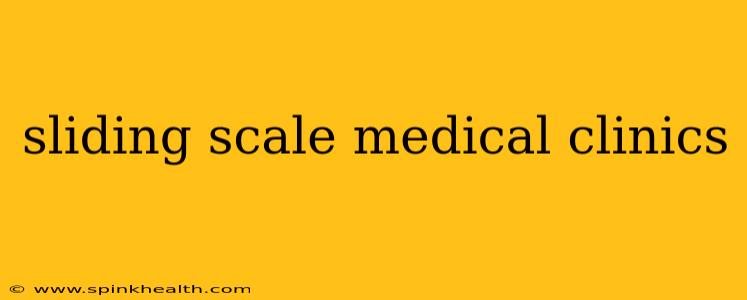The relentless rise in healthcare costs has left many struggling to access essential medical services. Imagine needing a doctor's visit but facing a financial barrier so significant it prevents you from seeking the care you desperately need. This is a reality for far too many people, but thankfully, a beacon of hope shines brightly in the form of sliding scale medical clinics. These invaluable community resources offer a lifeline, providing healthcare based on a patient's ability to pay. Let's delve into the world of sliding scale clinics, exploring what they are, how they work, and their vital role in ensuring healthcare accessibility.
What is a Sliding Scale Medical Clinic?
A sliding scale medical clinic is a healthcare provider that adjusts its fees based on a patient's income and family size. Instead of a fixed price for services, the clinic uses a sliding scale, meaning the cost of care varies depending on the patient's financial situation. This ensures that everyone, regardless of their financial status, can access necessary medical care. It's a compassionate approach that acknowledges the financial disparities in our communities and actively works to bridge the gap. Think of it as a flexible payment system tailored to individual needs, ensuring affordability without sacrificing quality of care.
How Do Sliding Scale Clinics Determine Fees?
The process of determining fees varies from clinic to clinic, but generally involves an assessment of the patient's financial information. This often includes providing proof of income, such as pay stubs or tax returns. The clinic then uses this information to calculate a patient's ability to pay, placing them on a specific point on the sliding scale. This ensures a fair and equitable system where those with lower incomes pay less, and those with higher incomes contribute more to support the clinic's operations. The goal isn't to profit from patients' struggles; it's to ensure everyone has access to the healthcare they need.
What Services Do Sliding Scale Clinics Offer?
The services offered by sliding scale clinics vary depending on the clinic's size, resources, and the community it serves. However, many clinics offer a range of services, including:
- Primary care: Routine checkups, vaccinations, and management of chronic conditions.
- Preventive care: Screenings for diseases such as cancer and diabetes.
- Diagnostic testing: Blood tests, X-rays, and other diagnostic procedures.
- Mental health services: Counseling and therapy.
- Prescription medications: Some clinics may offer discounted or subsidized medications.
These services are crucial for maintaining good health, preventing serious illnesses, and ensuring individuals receive the ongoing care they need. The comprehensive nature of these services is a testament to the clinic's commitment to patient well-being.
Are Sliding Scale Clinics Right for Me?
If you are struggling to afford healthcare, a sliding scale clinic might be the perfect solution. Many people who utilize these clinics are uninsured, underinsured, or simply cannot afford the high costs associated with traditional healthcare. Don’t be afraid to explore this option. It's a path to better health that's designed to be accessible and affordable.
How Can I Find a Sliding Scale Medical Clinic Near Me?
Locating a sliding scale clinic in your area is easier than you might think. A simple online search using terms like "sliding scale clinic near me" or "affordable healthcare [your city/state]" will usually yield numerous results. You can also check with local health departments, community health centers, or faith-based organizations for recommendations and referrals. Remember, accessing affordable healthcare shouldn't be a struggle; these resources are there to help.
What are the Differences Between a Sliding Scale Clinic and a Free Clinic?
While both offer affordable healthcare, there's a key distinction. Free clinics typically provide services at no cost, relying entirely on donations and volunteers. Sliding scale clinics, on the other hand, adjust fees based on income, allowing those who can afford to contribute a greater share to support the clinic's operations and those less fortunate to receive care based on their means. Both play critical roles in providing access to healthcare for underserved populations.
How are Sliding Scale Clinics Funded?
Sliding scale clinics often rely on a combination of funding sources to remain operational. These sources might include:
- Government grants: Funding from federal, state, or local government programs.
- Private donations: Contributions from individuals, foundations, and corporations.
- Patient fees: Contributions from patients based on their income level.
- Fundraising events: Events organized to generate funds for the clinic.
The multifaceted approach to funding ensures the clinic's sustainability and ability to serve the community effectively.
Do Sliding Scale Clinics Accept Insurance?
While many sliding scale clinics accept insurance, this isn't always the case. It's important to check with individual clinics to determine their insurance policies. Some may supplement existing insurance coverage, reducing out-of-pocket expenses, while others may not accept insurance at all, offering services as an alternative to traditional, high-cost care.
In conclusion, sliding scale medical clinics are vital community assets, offering a bridge to affordable and accessible healthcare for those in need. Their commitment to providing quality care based on individual financial circumstances makes them a critical component of a healthier and more equitable society.

